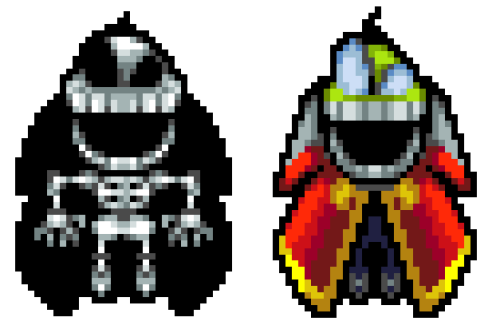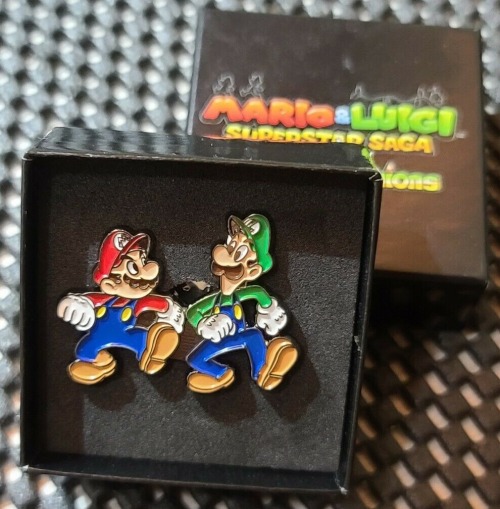Smallmariofindings - Tumblr Posts

Officially licensed Mario & Luigi: Bowser’s Inside Story Nintendo DS styluses from Japan. This is the only instance of official merchandise depicting a Toad with Blorbs (second stylus from the left).
Main Blog | Twitter | Patreon | Source: see bottom of image

Unused sprites of Fawful being hit with electricity, found in the data of Bowser’s Inside Story.
Main Blog | Twitter | Patreon | Small Findings | Source

In Mario & Luigi: Bowser’s Inside Story + Bowser Jr.’s Journey, activating the spin formation after exiting a pipe while facing towards the screen in a 2D section will turn Mario and Luigi invisible until they move.
Main Blog | Twitter | Patreon | Small Findings | Source: twitter.com user “Camnose_”

Officially licensed 1989 Bowser doorknob hanger.
Main Blog | Twitter | Patreon | Small Findings | Source

Desktop clock widget available for download from Nintendo of America’s official site for Mario & Luigi: Partners in Time in 2005.
Main Blog | Twitter | Patreon | Small Findings | Source

Before the final battle against Fawful in Mario & Luigi: Superstar Saga, Fawful misspells Cackletta’s name as “Cakletta” without the second “c” in a cutscene.
Main Blog | Twitter | Patreon | Small Findings | Source

In Mario & Luigi: Superstar Saga, when Mario and Luigi are split up, giving Teeheespresso to the brother that is currently being controlled will cause the stat display to become glitched. The Teeheespresso itself is not consumed during this; in order to be able to actually drink the Teeheespresso, the brothers must be reunited.
Main Blog | Twitter | Patreon | Small Findings | Source

In the Vim Factory in Mario & Luigi: Partners in Time, a section in the vents can be skipped entirely by walking into the wall in the manner shown in the footage. Baby Mario and Baby Luigi will clip out of bounds and be able to walk around the entire area, clipping back into bounds near the exit.
Main Blog | Twitter | Patreon | Source: youtube.com user “SolidifiedGaming”




Unused maps found in the code of Mario & Luigi: Bowser’s Inside Story that depict the environment as extremely simplistic geometric shapes. Note that all of these are dedicated graphics used for only these maps; this may provide insight into the level design process as it suggests that the game’s maps were first built with these shapes before being redrawn with the finished game’s graphics.
Main Blog | Twitter | Patreon | Small Findings | Source

Unused room found in the files of Mario & Luigi: Bowser’s Inside Story. It seems to depict an alternate version of the entrance to the Tower of Yikk, which is completely redrawn and facing a different way compared to the finished version.
Main Blog | Twitter | Patreon | Small Findings | Source



The Japanese box artwork for Mario & Luigi: Superstar Saga contains small upside-down drawings of Cackletta, Peach and Popple (turned right side up below) that are absent from the standalone logo artwork used in other regions, which includes only the logotype and the Mario and Luigi artwork.
Main Blog | Twitter | Patreon | Small Findings | Source

In Mario & Luigi: Superstar Saga, by maneuvering Mario into a precise position behind Luigi in the beginning segment, Mario can be made to disappear. He is actually teleported to a point far above the playable area and will fall down eventually if the player moves around.
Main Blog | Twitter | Patreon | Source: youtube.com user “weegeechan”


Before the battle against Midbus in the Fawful Theater in Mario & Luigi: Bowser’s Inside Story, a single Shroob from Mario & Luigi: Partners in Time can be found sitting in the audience, replying only with ellipses when interacted with. While later, an optional battle against Shroobs can be discovered, those Shroobs are thawed out from cold storage; this is the only Shroob found outside the storage room in the game.
Main Blog | Twitter | Patreon | Source: twitter.com user “mariosecrets”

Sprites used for passport photos in Mario & Luigi: Superstar Saga + Bowser’s Minions, extracted from the game’s files. While the original Game Boy Advance version had many more than 5 different expressions (as they depended on location, direction pressed, and story progression), it simply reused sprites from other scenes in the game. The remake reduces the expressions to 5 for each character, but gives each of them unique sprites used only on the passports.
Main Blog | Twitter | Patreon | Small Findings | Source

Promotional Japanese pin to commemorate the release of Mario & Luigi: Superstar Saga in 2003. The dates on the bottom refer to Mario and Luigi’s (at the time) 20-year span as a brother team, 1983 being the date of the release of the Mario Bros. games (arcade and Game & Watch), which introduced Luigi as a character.
Main Blog | Twitter | Patreon | Small Findings | Source

Rare UK-exclusive pin available to customers who preordered Mario & Luigi: Superstar Saga + Bowser’s Minions in 2017.
Main Blog | Twitter | Patreon | Small Findings | Source

2005 Japanese print ad for Mario & Luigi: Partners in Time.
Main Blog | Twitter | Patreon | Source: twitter.com user “blacktangent”


Top: Broque Madame is a character who appears in Mario & Luigi: Bowser’s Inside Story (and its remake) as well as in Mario & Luigi: Dream Team. In all of these games, she speaks with a French accent and uses French words in her speech. One word she uses frequently is “cherí” [sic].
Bottom: However, that is a misspelling of the actual French word, which is spelled “chéri” instead, with the accent on the “e”. “Cherí” with the accent on the last letter does not exist in French. This was not fixed for the remake of Mario & Luigi: Bowser’s Inside Story.
Main Blog | Twitter | Patreon | Small Findings | Source

Print ad for Mario & Luigi: Superstar Saga as part of Nintendo of America’s “Who Are You?” marketing campaign.
Main Blog | Twitter | Patreon | Source: Nintendo Power (US), Issue 175, 2004


Top: near the beginning of Mario & Luigi: Superstar Saga, Toad is very briefly playable inside Mario’s house. The cutscene where Toad runs into the house ends without any indication that Toad is now playable, and it may take some time for the player to realize that nothing is happening and to try pressing random buttons, leading to Toad moving in response to the input.
Bottom: in the Japanese version of the game, which unusually for the time was released slightly later in Japan than in North America, a special D-pad icon was added in the bottom left to indicate that Toad can now be controlled, to prevent any potential confusion.
Main Blog | Twitter | Patreon | Small Findings | Source